#intimate partner violence
Text
Beware clickbait accusations
Hi fandom, here's what happened yesterday: A reporter named Rachel Johnson, who is the sister to Boris Johnson and a big terfy supporter of JK Rowling, released a 4-part true crime podcast featuring two women accusing Neil Gaiman of SA. Yesterday. The day before the UK elections. This post explores the possible political links in more detail.
CW: this post is free of graphic details, but if you follow these links, there may be explicit descriptions of sex, kink, and bdsm, plus mentions of mental illness and suicidal thoughts.
I want to believe and support survivors, and I also want to base my thoughts and actions on facts. I thought the xitter livestream commentary from Not Becky for all 4 episodes was very insightful. There's also a first episode transcript without extra commentary. (Edit: released after I wrote this post: the full audio plus transcripts for all four episodes of the podcast are now available to download here, or you can read all four transcripts in your browser.) I have since concluded (pending more time to think and read and learn, or any new information, of course):
This seems like the worst kind of clickbait, an unjustified mess that will hurt everyone involved (except possibly a few politicians who might benefit somehow, we'll see). The evidence the "reporters" present directly contradicts their accusations. They're counting on people reading headlines and not digging any deeper.
They tried to make something sinister where there was apparently consent and a caring relationship. Have they exploited one or both of these women? S, in particular, is described as vulnerable and with a history of unspecified mental illness. They have all of the message history between S and Neil, and her messages make the sexy stuff between the two of them sound enthusiastically consensual. There are even messages (multiple!) where she specifically says everything was consensual. Here's one:
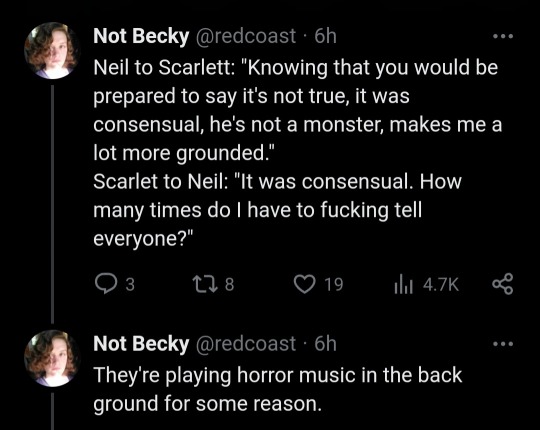
They're playing horror music in the background to try to make us feel horrified, even as S reassures us that things were consensual. It's emotional manipulation by the reporters.
The times S sounds upset during the interview are the times she talks about Neil leaving her behind or not paying attention to her. Not the times she talks about consent violations. Her stories during the interview are inconsistent, and they contradict her messages with Neil and with others. Maybe we'll get better information from a more reputable news source, or maybe not, I don't know. I also don't know why anyone who cares about her would have advised her to do this interview.
Then they tracked down lots of other women who know/have dated Neil and they all had glowing things to say, except one other lover from 20 years ago, K. She described some bad sex, and then pointed to a time in their 2-year relationship when she felt something wasn't consensual and he thought it was. And after their breakup, they continued to text and flirt, for decades.
This podcast "exposé" feels like explosive clickbait with political ramifications. The evidence here doesn't support a pattern of poor conduct so much as establish Neil as a fellow well-meaning human with imperfect judgement. That doesn't mean the accusations are all made up; intimate partner violence is complicated, and the responsibility for checking in and getting regular enthusiastic consent from partners is very real, especially when kink or bdsm are involved.
I don't know what the right balance is here between supporting survivors, thinking critically, assuming good intentions, and waiting for better information, but I feel confident that this podcast alone is not enough to condemn anyone aside from the irresponsible journalists who inflicted it on the rest of us.
PS/edit: I'm tagging my relevant posts (mostly reblogs) with #ineffable grief, and you can see all of them here.
#neil gaiman#clickbait#think critically#ineffable grief#be kind#intimate partner violence#mental health#Irresponsible journalists#uk politics#good omens fandom#good omens
808 notes
·
View notes
Text
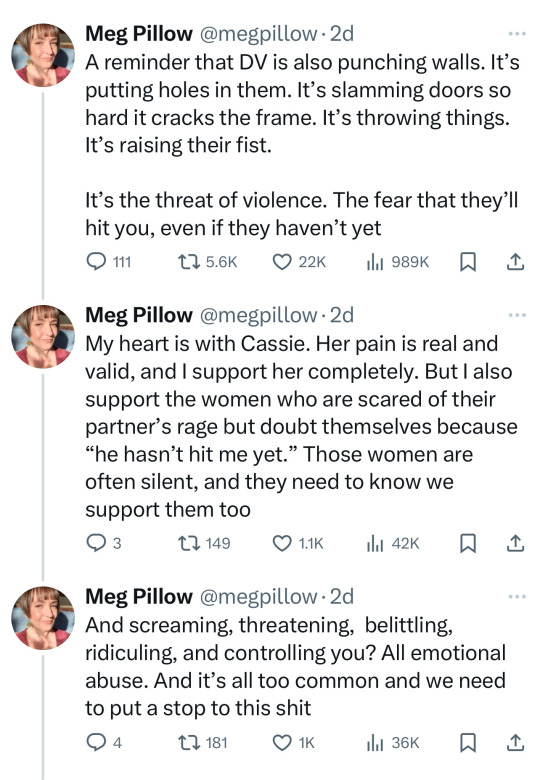
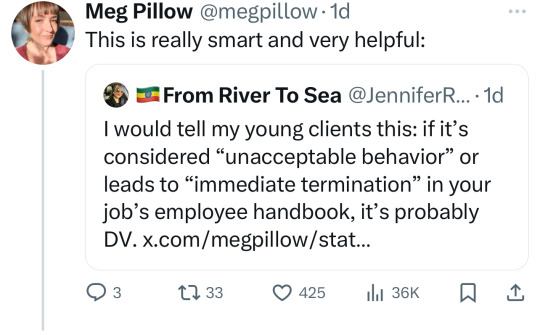
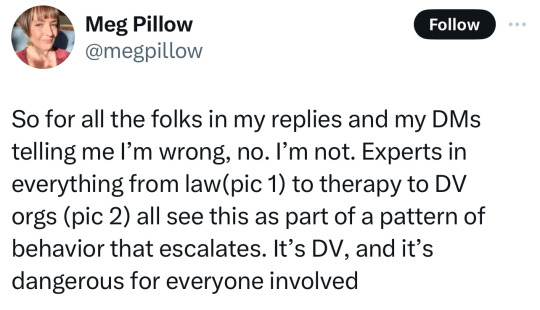
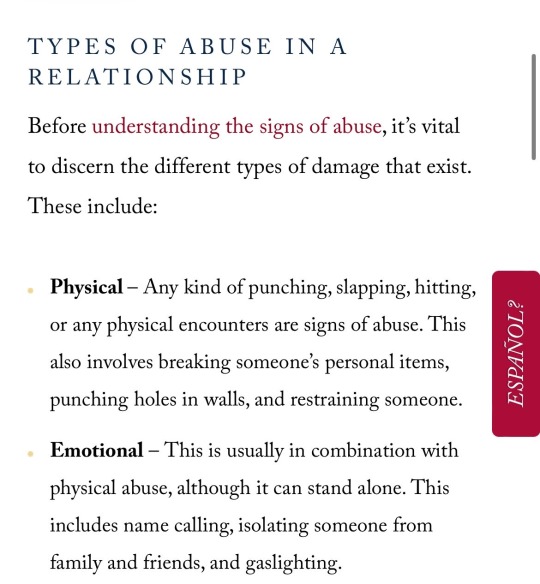
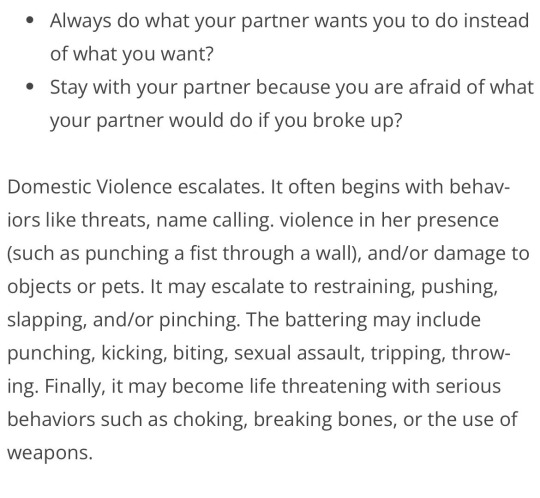
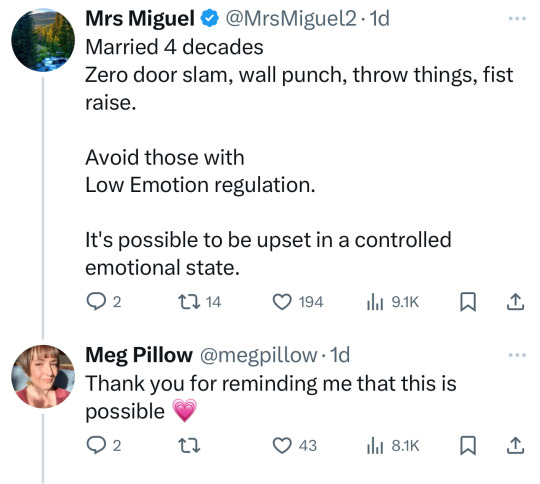
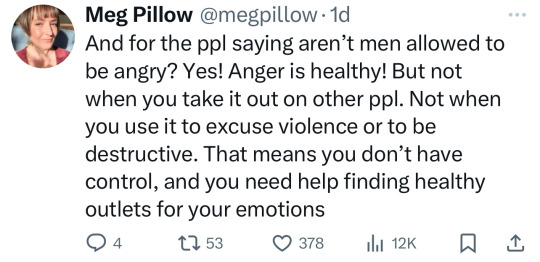
🗣️ If it’s considered ‘unacceptable behavior’ or leads to ‘immediate termination’ in your job’s employee handbook, then it’s probably DV
#intimate partner violence#dv#domestic violence#sean combs#johnny depp#cassie ventura#amber heard#domestic abuse#terfs dni
329 notes
·
View notes
Text


Rest in power, Rebecca 🤍
#rebecca cheptegei#gender based violence#intimate partner violence#note: not very happy with a lot of the media reporting about this because it's not death it's murder#we must stop using passive language when referring to incidents of gbv
97 notes
·
View notes
Text
Two Women Died on an Alaska Mayor’s Property. No One Has Ever Been Charged. — ProPublica
Kirk and Norton, both Inupiaq, had each dated sons of the former borough mayor, and the sons had previously been convicted of beating each of them. One of the sons had admitted to strangling Kirk twice before. Another pleaded guilty to kicking Norton in the stomach when she was six months pregnant.
No one has ever been charged with a crime in connection to the deaths.
In a state where women are 2.5 times more likely than the national average to be killed by a man and Alaska Native women are especially at risk, elected leaders here have repeatedly pledged action. The Department of Justice declared a rural law enforcement emergency in Alaska following a 2019 report by the Anchorage Daily News and ProPublica on glaring lapses in local policing. Two years later, the governor created a state council on Missing and Murdered Indigenous Persons, and in 2022, new investigators were hired to solve cases like Norton’s.
Unexplained holes in the investigations into the deaths of Kirk and Norton call into question this commitment, a review by the Anchorage Daily News and ProPublica found. More than that, the events leading up to the women’s deaths illustrate how police, prosecutors and judges here have regularly given pass after pass to people accused of domestic violence and strangulation.
338 notes
·
View notes
Text

#sanctuary for families#intimate partner violence#roe v wade#unplanned pregnancies#homicicide of pregnant women#reproductive health#reproductive rights#reproductive justice#abortion rights#republican assholes#Republican rapists
148 notes
·
View notes
Text
"Under a Missouri statute that has recently gained nationwide attention, every petitioner for divorce is required to disclose their pregnancy status. In practice, experts say, those who are pregnant are barred from legally dissolving their marriage. “The application [of the law] is an outright ban,” said Danielle Drake, attorney at Parks & Drake. When Drake learned her then husband was having an affair, her own divorce stalled because she was pregnant. Two other states have similar laws: Texas and Arkansas."
"Missouri is particularly restrictive when it comes to reproductive health and autonomy. It was one of the first to ban abortion after Roe v Wade was overturned in 2022, including in cases of rape and incest. Research shows that abortion restrictions can effectively give cover to reproductive coercion and sexual violence: the National Hotline for Domestic Violence said it saw a 99% increase in calls during the first year after the loss of the constitutional right to abortion."
"Advocates are currently trying to gather enough signatures to put a constitutional amendment on the ballot that would make abortion legal until fetal viability, or around 24 weeks."
"In Missouri, homicide was the third leading cause of deaths in connection with pregnancy between 2018–2022, the majority (75%) of which occurred among Black women, according to a 2023 report by the Missouri department of health and senior services, which examines maternal mortality data. In every case, the perpetrator was a current or former partner. And in 2022, 23,252 individuals in the state received services after reporting domestic violence, according to the latest reporting from Missouri Coalition Against Domestic & Sexual Violence, which compiles data from direct service providers in the state."
The dystopia we speak of -across many of issues that women and marginalized folks face is HERE already. This is terrifying.
#feminist#feminism#social justice#current events#current news#missouri#missouri law#united states#partner abuse#tw abuse#intersectionality#intersectional feminism#violence against women#intimate partner violence#intimate partner abuse#divorce#relationship#us law#important#information#pregnancy#gender violence#bodily autonomy#womens rights#reproductive freedom#abortion is healthcare
136 notes
·
View notes
Text
#brad pitt#anti brad pitt#angelina jolie#brangelina#johnny depp#anti johnny depp#amber heard#i stand with amber heard#harvey weinstein#jennifer aniston#gwyneth paltrow#friends#intimate partner violence#domestic violence#child abuse#hollywood#your fave is problematic#misogyny
27 notes
·
View notes
Text
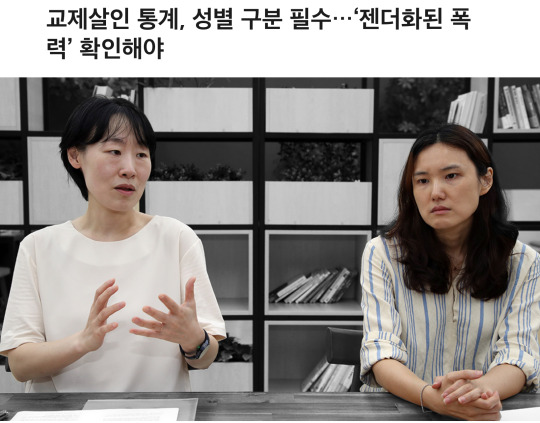
Statistics on Intimate Partner Homicides, Gender Classification Essential: We Need to Recognize ‘Gender-Based Violence’
this interview is originally in Korean, it’s been MTL and edited here. I can’t say it’s going to be exact so I wouldn’t rely on this as a 1:1 especially since I think some of these translators ‘summarize’ paragraphs sometimes, but I think the statistics are worth looking at and those should be understandable. if you happen to see anything glaringly wrong lmk and I’ll edit it. It’s pretty long in terms of tumblr posts so I put most of it under a cut.
To 'you' who still blames the victim
Police, the first statistics of last year… 24% of all murder cases
There is no gender distinction, so the risk of women is impossible to understand.
Intimate partner violence and homicides occasionally make headlines, but the exact scale of the problem is still not well understood in South Korea. Last year, the police began gathering data on the number of homicides stemming from intimate relationships for the first time. In 2023, the suspects in homicide cases (including attempted murder) totaled 778. Of these, 192 people (24.6%) committed their crimes against a current or former spouse, romantic partner, or common-law spouse. This was the first time the police had identified the scale of homicides resulting from "intimate relationships."
However, it is still difficult to grasp how much danger women face from intimate partner violence because the statistics did not differentiate by gender. Hyo-jung Kim, a research fellow at the Korean Women's Development Institute, noted, “According to data from the United Nations Department of Economic and Social Affairs, while the majority of homicide victims are men, when the perpetrator is narrowed to an intimate partner, over 80% of the victims are women.” She emphasized, “This is ‘gendered crime.’” Sun-hye Choi, Secretary-General of Korea Women’s Hotline, added, “The police left out the most crucial part: gender, releasing only half of the necessary statistics.” Both Kim and Choi were interviewed for this article.
The Importance of Last Year’s Statistics
Kim Hyo-jung: The fact that the police even attempted to check for previous victimization shows that they put in some effort. However, considering the effort put in, the results are too inadequate. There are no gendered statistics, and there’s no essential information on whether it was compound victimization or exclusively checked.
Choi Sun-hye: I’m not sure if the police had a clear purpose for collecting these statistics. The police need to figure out at which stage they missed something when someone is killed, and where they failed to detect warning signs. From the initial report to the end, they must track what went wrong—whether it was with the investigation or with legal and institutional limitations.
Korea Women’s Hotline (twitter acct) has been independently analyzing incidents based on media reports since 2009 and has published the “Gauge of Fury” statistics for 15 years. According to their data, at least 138 women were killed by intimate male partners in 2023, and at least 311 women experienced threats.
Kim Hyo-jung: The "Gauge of Fury" is a result of painstakingly analyzing reported homicide cases one by one. Since unreported incidents are excluded, this number can only be considered an underestimate. If the government was committed, they could easily conduct a full investigation into the 800 or so homicides that occur annually to determine how many women are victims. When talking about preventing and responding to gender-based violence, the most fundamental thing to build is statistics. To solve any problem, you must first understand the actual situation and current conditions. The UN and international organizations also stress this importance and call for basic gender-disaggregated statistics.
Kim also participated in compiling the 2022 statistics on violence against women.
Kim Hyo-jung: The 2022 statistics on violence against women are significant because they consolidated various statistics scattered across the Ministry of Gender Equality and Family, the Ministry of Justice, and the Supreme Prosecutors' Office, organizing them into categories like crime occurrences, victim protection, and support. However, the problem is that discussions haven’t moved on to the next stage. For example, there are housing support systems for victims of sexual and domestic violence, but there are no precise statistics on how much housing support is provided to victims of gender-based violence. The next step should be producing such data. Some statistics are being generated, but they are not gender-disaggregated, which makes them less meaningful. The conversation should now move towards generating gender-disaggregated statistics. However, we are not progressing in that direction.
There are criticisms that intimate partner violence and homicides are treated as less important than other crimes.
Choi Sun-hye: So many women are dying, yet there is no sense of urgency. Even though women’s organizations have been saying for over 10 years that women are dying, with some stating that one woman dies every two days, society doesn’t seem to view it as important.
Kim Hyo-jung: If a child doesn’t show up to school, the Ministry of Education immediately conducts a full investigation. Last summer, when there was a series of random violent crimes, the police even deployed tanks. But when so many women are being killed, and the issue is constantly being raised, it’s shocking that there’s such little movement in response.
Recognizing Gender-Based Violence as a Structural Problem
Choi Sun-hye: There seems to be strong resistance to seeing violence in intimate relationships as a structural issue. When an intimate partner violence case occurs, the perpetrator is often treated as an abnormal or troubled individual, and the victim is criticized for not seeking help from the authorities. The narrative becomes "Oh, another man killed someone,” turning it into a case of personal blame where the individual is demonized, and the story ends there. We need to discuss these cases as structural issues to avoid turning them into gender battles.
Kim Hyo-jung: If there were a social consensus around the concept of "gender-based violence," even if there were setbacks, we could continue progressing in that direction. But Korean society doesn’t accept that. It fundamentally refuses to recognize that there is structural gender inequality. That leads to the issue becoming individualized and fragmented, turning the perpetrator into a demonized figure. Korea already has the institutions in place. In fact, the sexual crime response system here is so well-developed that people from abroad come to learn about it. The problem is the "perspective." There are countless response plans from various ministries, but when you examine them, there’s no national gender perspective. Without an understanding of gender-based violence, there is fear of countercharges. The fact that we still hear nonsensical questions like, “Why do we have a Ministry of Gender Equality and Family but not a Ministry of Men and Family?” reflects this.
This lack of perspective is greatly influenced by the Ministry of Gender Equality and Family’s ambiguous position. When the ministry outlined countermeasures against intimate partner violence in June, I thought, “They’ve brought out everything they can, even from their limited resources.” They presented everything they could, but the fact is, they don’t have the authority to do more.
The Importance of Investigators’ Perspective on Crime
Choi Sun-hye: Investigators need to have a higher level of awareness than the general public. The biggest issue arises when their awareness is lower than the victim's. If investigators tell a victim, “You should have been clearer about your refusal at that time,” it can be difficult for a victim, who may lack legal knowledge, to assess how dangerous their situation is. Investigators, with their experience, should be able to tell victims, “You are in a very dangerous situation and need support.”
Calls for harsher penalties for crimes committed in intimate relationships.
Kim Hyo-jung: The case in Geoje, for instance, if it hadn’t come to light, would likely have been classified as involuntary manslaughter. It wouldn’t have been recognized as a homicide case. There’s talk of increasing penalties, but crimes between strangers should at least be punished to the same degree. In cases of domestic violence, if they are treated as family protection cases, there’s no criminal record. Offenders may receive a deferred prosecution on the condition they attend counseling, and if the victim says they don’t want punishment, it’s usually accepted. This approach only applies to violence in intimate relationships. The Domestic Violence Punishment Act should prioritize victim protection and safety above family protection, starting with its purpose clause, but that’s not happening.
Views on Legislation Regarding Intimate Partner Violence Vary
Choi Sun-hye: The easiest way is to simply expand the scope of the Domestic Violence Punishment Act. That’s why such amendment bills are being discussed. However, the first priority should be improving the parts of the Domestic Violence Punishment Act that are not working properly. Moreover, laws are too fragmented. There’s the Domestic Violence Punishment Act, the Stalking Punishment Act, etc. These divisions can confuse field officers when deciding on emergency measures due to overlap. We need a comprehensive approach to address both the issue of inadequate penalties for violence due to intimacy and the need for victim protection during investigations and trials. We should think about how to legally define intimate partner violence within that framework.
Kim Hyo-jung: Although overcoming the strong perception that “families must be protected” is difficult, the purpose clause of the Domestic Violence Punishment Act must be entirely revised. However, that will take time, and addressing intimate partner violence is urgent, so we should start by regulating it within the law and eliminating the provision allowing victims to request non-punishment. While doing that, we can also discuss revising the law entirely. There are many ways to approach this issue, but it seems like people are overly cautious about addressing it head-on.
Re: Defining Intimate Relationships
Kim Hyo-jung: It’s really a problem. People argue that intimate relationships are private matters, and that defining them is difficult because they’re personal and internal. But other countries do define them. In the UK, an intimate relationship is defined as being with someone you’re close to, and this concept is embedded in their homicide laws. If we don’t start discussing how to legally define intimate partner violence soon, it will take years before any legislation is passed.
The Law Fails to Cross the Threshold of the Home Due to Dated Beliefs
This belief persists because criminal justice agencies prioritize convenience and fail to see things from the victim's perspective. As a result, the legal system doesn't go beyond distinguishing between legal and common-law marriages.
70,000 Reports - 12,000 Arrests - 1.8% Incarceration Rate
The number of reports related to dating violence continues to rise, but the number of arrests is far below the number of reports. The rate of judicial action is even lower.
Choi Sun-hye: As of 2022, there were 70,000 reports of dating violence to the 112 emergency line, but only 12,000 people were arrested, a significant drop. This is because in cases involving assault, injury, threats, etc., many victims express a desire not to punish the perpetrator. While the majority of victims are women, many cases get entangled in mutual accusations. Looking at the judicial process, the incarceration rate is only 1.8%. For domestic violence, the rate is 3.6%; for sexual violence, 3.6%; and for stalking, 3.7%. If only about 4% of arrests result in incarceration, who would want to report the crime? Victims report only when they believe in the social system, when they believe the system will protect them and alleviate their fear of the perpetrator, and when they believe that the perpetrator will not be able to retaliate against them. From this, we can understand why many do not report.
“Why didn’t you leave?” People still ask the victim.
Kim Hyo-jung: There’s a growing recognition that domestic violence is a crime. When a victim stays in the relationship and problems arise, people understand that there may have been complex issues, such as children being involved. In contrast, victims of dating violence are still asked, “Why didn’t you break up?” This shows a lack of understanding that, in the context of gender-based violence, the perpetrator and the victim are not in an equal relationship. As early as the 2000s, women-centered communities were already talking about "safe breakups." Victims are aware that they are in a structure where it’s difficult to make demands.
A “tough response to crime” is often listed as a policy that Gen 2030 (women in their 20s?) women want. “How can I have a relationship and marriage when I could die?”
Kim Hyo-jung: One of the main causes of the ultra-low birthrate, according to demographers and sociologists, is social inequality. Gender equality is a crucial key to solving these demographic problems. A society where violence against women occurs and misogyny is rampant can never be a gender-equal society. The fear of becoming a victim of crime is gendered. The fact that women are more fearful of crime is a significant indicator that the society is not gender-equal. It is very reasonable to connect the issue of gender-based violence with the ultra-low birthrate problem. Establishing a solid understanding of gender-based violence is the starting point. Instead of patching up leaks one at a time, we need to start by setting the right perspective and building a structural framework to address the problem.
#South korea#korean women’s hot line#Korean Women's Development Institute#Choi Sun-hye#Kim Hyo-jung#Interview#article#femicide#intimate partner violence
20 notes
·
View notes
Text
Don't Worry Feyre, Darling: the relationship anxiety to coersive control pipeline
CW: emotional abuse, reproductive abuse
Creds: licensed counselor with focus in addiction, trauma, and gay stuff; experience in group and family counseling, mandated DV clients, and abuse victim support.
Before the mob comes: I am not pro or anti Rhys, and I think his contradictions say much more about SJM than anything. I also believe it’s possible for a fandom to reclaim/rewrite a character who has been massacred by an author.
We’re going to begin at Rhys helping Feyre during an extremely dark place in both their lives. We’re going to end at him withholding vital medical information from her for the sake of “protecting her”. But first, some context.
Inside all of the (amazing) drama around the 2022 movie Don’t Worry, Darling , was a story that is pretty well worn at this point: men deciding they know what’s best for women and giving it to them whether they like it or not. In the movie, Florence Pugh’s Alice lives inside a computer simulation where she is the modern equivalent of a 50s housewife: dresses, calisthenics, martinis, “making a roast”. (She also gets eaten out by Harry Styles but that doesn’t seem to be an explicit part of the world’s design.) The problem? She doesn’t know she’s in the simulation. Harry Styles, in between all the cunnilingus, drugged her and put her in the program against her will. Yikes! Why!
The movie explains that he believed their life in the real world was miserable, and that he was saving her from that by giving her this perfect life. She should be grateful, if anything! What he doesn’t tell her, but that we see, is that Harry Styles also seems to struggle with a sense of inadequacy for not being able to provide. He is failing to live up to personal and cultural standards of manhood but, instead of dismantling those standards, he makes it his wife’s problem by kidnapping and brainwashing her consciousness. Hm. Interesting strategy. Let’s see how it works out for him.
With Rhysand, his motives in the beginning are more understandable - he initiates rescuing Feyre from the very real danger of Tamlin and her own mental decline. He feels justified breaking whatever magic law because of his own experiences being trapped and believing people should have a choice about where they go and who they are. He emphasizes over and over that these choices are Feyre’s and that she has freedom with him. We see through ACOMAF that helping her gives him a sense of purpose after the trauma UTM. His friends remark on how Feyre brought him back to life, never questioning and even encouraging this pattern.
But Rhys clearly has a lot of anxiety about his relationships and closeness in general. He mentions on several occasions that people around him tend to suffer because of him, and how afraid he is of doing that to Feyre. She is very receptive to this and puts effort into proving him wrong. He finds safety in the bubble of their relationship that probably feels pretty fucking good. The unfortunate side effect of this is that instead of processing and resolving his own anxiety, he directs it through Feyre and his love for her. Meanwhile, he keeps his anxious maneuvers behind the scenes, like not telling her about the bond, taking her to the Weaver, encouraging her to learn to read, to train. It may be genuinely helping her, but there’s also this sense of ‘I know what you need better than you do’. And again, nobody questions this.
We flirt with this tension at the beginning of ACOMAF when Rhys enforces their bargain from UTM. As the reader, at that point, we are supposed to believe this is cruel of him. He interrupts her wedding for fucks sake, throw your shoe at him girl! But over time we start to feel like it’s okay because Feyre secretly wanted it, it’s ultimately for her own good. Rhys is the most powerful High Lord in history, I’m sure he could’ve figured out a way to break the bargain, but he didn’t. In fact he engineered a situation where she'd be at his mercy. Why? Because Rhys was worried about Feyre, felt her deteriorating through the bond. Because of that, he felt justified in coming to collect. Personally, I have no opinion about whether crashing the wedding was the right or wrong thing to do. But it does set up, at least in the world of the book, that removing someone’s autonomy is okay if it’s for their own good, if the ends justify the means. In fact, that overstep ends up being the road to Feyre’s life in the NC and her love with Rhysand, a love that is so great she willingly tethers her very life to it. Even in ACOWAR we see how their relationship is a way he regulates his anxiety *cough*battlefield blowjob*cough*. He gets used to Feyre’s health and happiness being his source comfort and can continue to avoid dealing with his own shit internally.
In his seminal work Why Does He Do That?, Lundy Bancroft, a specialist in treatment of abuse perpetrators, debunks the various myths about what causes abuse and why it happens. His thesis is disarmingly simple: people abuse because they believe it’s justified. He says one of the signs of abuse escalation is “a growing attitude that he knows what is good for her better than she does”. Bancroft also notes that abuse is so hard to spot because “most abusive men don’t seem like abusers” (emphasis his) and that abusive men have periods of being charming, funny, even kind. Abusive men often don’t see themselves as such, because the strategy works for them - they feel good when they displace their emotional problems onto someone else.(1)
And then Feyre gets pregnant with a baby that could kill her. Besides the fact they really should have talked about this before trying for a baby given Rhys is mixed race (Cassian and Nesta too, but that’s a whole other post), Rhys claims a sense of ownership over his wife and child almost immediately. He’s constantly being described as smug and glowing with male pride. Even when he’s not smarmy, he’s consumed with his own ideas about protecting them and can’t hear the protests of others. We see his anxiety morph into more overt control in attempt to handle the situation. He believes he’s justified in keeping the danger from Feyre because he doesn’t want to stress her out. But that is not about Feyre, that’s about Rhys. HE is scared, HE is lost, and so he makes a decision on her behalf to lessen the burden he’s already carrying, whether he’s aware of it or not. He must keep her in a happy bubble else how is he supposed to go on.
Don’t Worry, Darling is at least critical of this ‘I know better’ motive even if the movie is stupid, and Harry Styles gets some frontier justice in the form of a whiskey glass to the back of the dome. But ACOSF condones Rhys’ actions and even insinuates our main character is deserving of death for calling him out. Bancroft writes that “part of how the abuser escapes confronting himself is by convincing you that you are the cause of his behavior”. He wouldn’t HAVE to do this if you just TRUSTED HIM.
But here’s what I think. I think Rhys has walked down a path of using his relationship to balance his internal conflict. Anxiety is a force in every relationship, but with Feyre he must maintain her beautiful life where she never worries in order to feel safe himself. I can have empathy for this, kind of - he’s suffered significant losses and it’s understandable he feels protective of those he loves. I think about celebrities with non-famous spouses, and how they avoid talking about them because they don’t want the scrutiny. I believe Rhys thinks he’s genuinely doing right by Feyre. But Rhys is so averse to his own anxiety that he can’t let himself trust anyone else to resolve it. He can’t let go of Feyre as his safe space and almost condemns her to die because of it.
And this is how, ultimately, Rhys traps himself. He tries to create a bubble where Feyre can never leave him, and ends up signing both their death warrants. I hope the world of fan fiction can redeem him, because I really don’t think Sarah can.
And yes, I know it’s faerie porn and it’s not that deep. But this is a series marketed toward an audience at risk of abuse and intimate partner violence. Bancroft lays out key points at the end of the book that feel particularly relevant to the larger conversation:
“Once we tear the cover of excuses, distortions, and manipulations off abusers, they suddenly find abuse much harder to get away with.
If Mothers Against Drunk Driving can change culture’s indifference to alcohol-related automotive deaths, we can change culture’s attitude toward partner abuse.
Everyone has a role to play in ending abuse.
If you are trying to assist an abused woman, get help and support yourself as well
All forms of chronic mistreatment in the world are interwoven. When we take one apart, all the rest start to unravel as well.”
Why Does He Do That? , Lundy Bancroft. https://ia800108.us.archive.org/30/items/LundyWhyDoesHeDoThat/Lundy_Why-does-he-do-that.pdf
#acotar#acomaf#acosf#rhys critical#feysand is dysfunctional#don't kill me#intimate partner violence#why does he do that?#prythian university#sjm critical
63 notes
·
View notes
Text
I am begging everyone to understand that lesbians are not exempt from abuse by men and are sometimes even targeted by men because we are lesbians. Relationship violence is not the only kind of violence women face and even if it were, many lesbians refuse to date men partially because of the violence men have perpetrated against us, including in the context of previous relationships. Being a lesbian is not a “privilege” my gd
This post is inclusive of all multiply marginalized lesbians (especially trans lesbians)
35 notes
·
View notes
Text


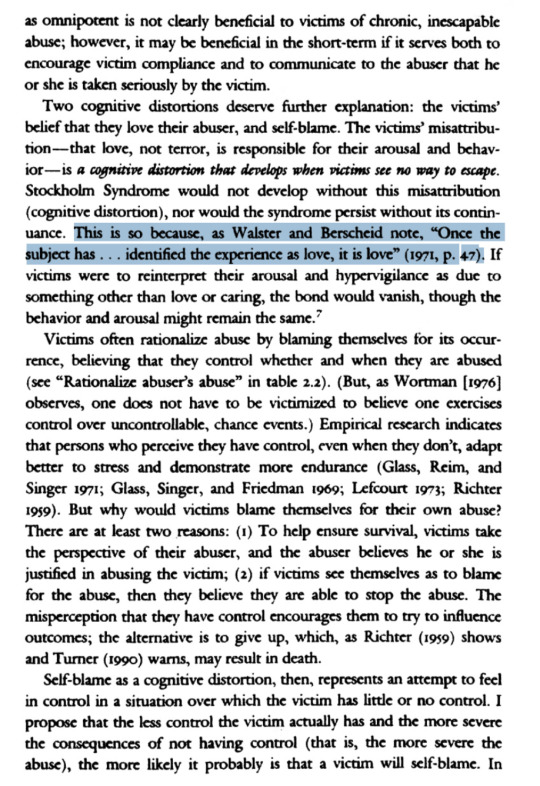
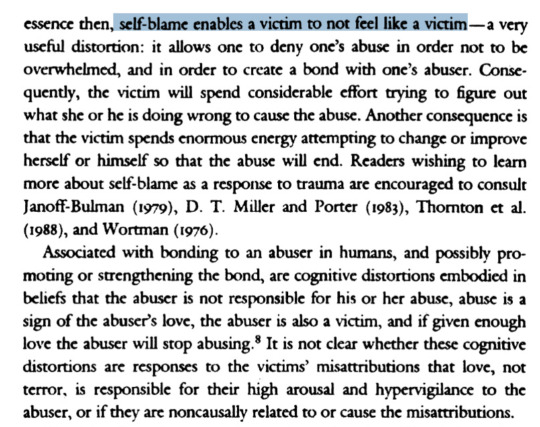
Loving to Survive: Sexual Terror, Men's Violence, and Women's Lives by Dee L.R. Graham
#dee l.r. graham#intimate partner violence#domestic violence#literature#the human custom of wrong love#trauma bonding#cognitive distortions#text#once the subject has identified the experience as love it is love#romantic love was invented to manipulate women#expiring for love is beautiful but stupid
50 notes
·
View notes
Text
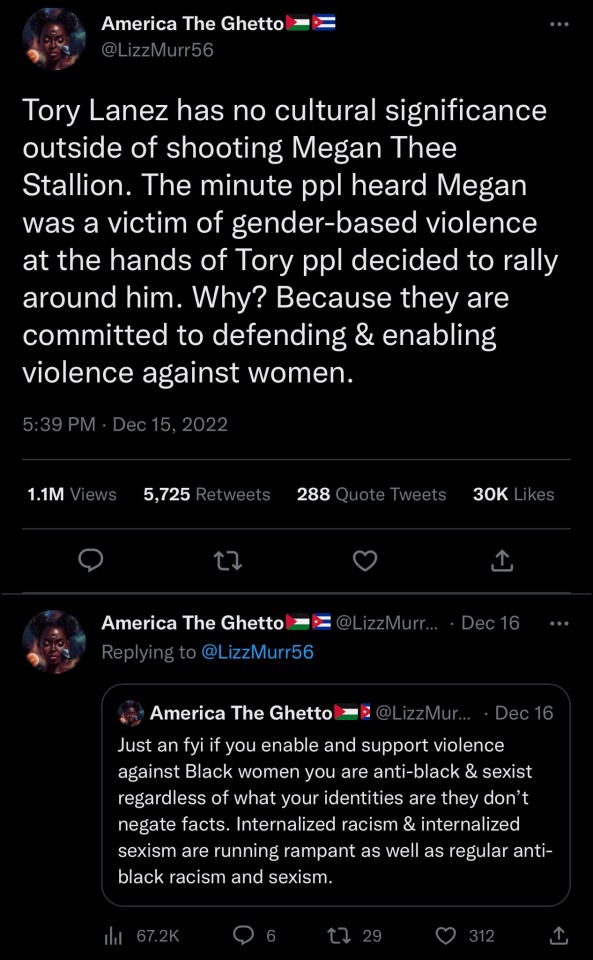


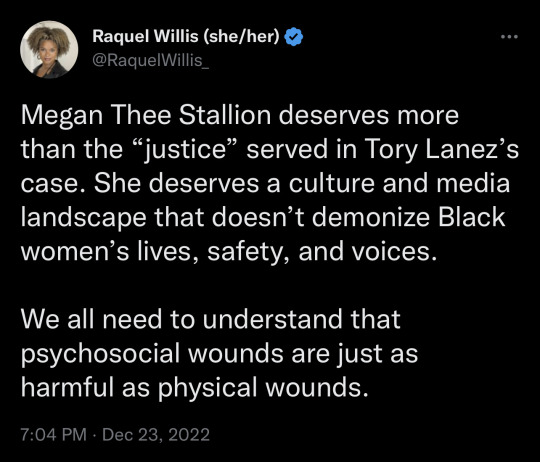
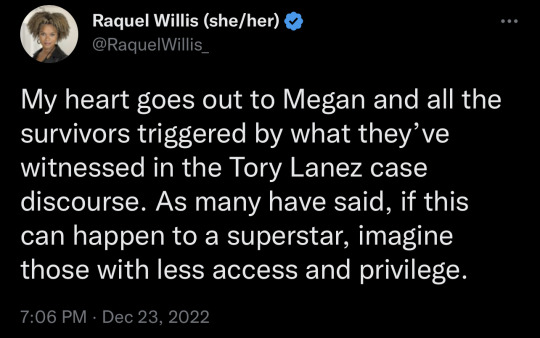

Remember, Megan Thee Stallion wasn’t the one who took sorry ass Tory Lanez to court - that was the state. It turns out that there are laws against shooting people. And Megan was a victim of domestic violence. It’s really sad seeing all the people victim blaming Megan for the “sin” of getting shot by Tory, and for not perjuring herself to protect her abuser.
#megan thee stallion#tory lanez#gun violence#abuser logic#victim blaming#dv#domestic violence#intimate partner violence#darvo
658 notes
·
View notes
Text


💜🎗🌈
17 notes
·
View notes
Text
"How a child custody battle becomes an extension of coercive control.
Post-separation control is a form of abuse used by abusive men to exercise control over the woman after the marriage or relationship has ended. It is embedded in a power and control cycle.
Control tactics can include dragging women through expensive litigation, harassment during visitation, gas lighting, legal silencing, isolation, and using children to harass. child contact provides coercive control-perpetrating fathers with opportunities to continue their abuse of children and ex-partners."
Pdf: When Coercive Control Continues to Harm Children: Post-Separation Fathering, Stalking and Domestic Violence
Pdf: The System Had Choked Me Too
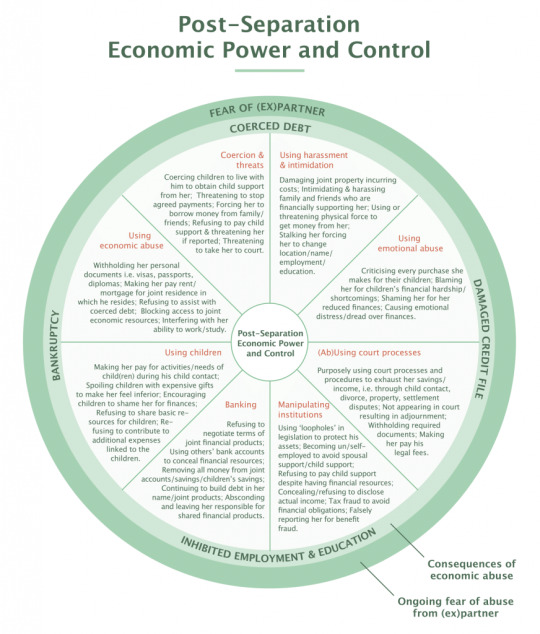
If this sounds familiar, it's because a version of this happened to Amber Heard.
This is a tactic that is almost exclusively used by men to punish and entrap women.
#domestic abuse and violence#radblr#radfems#feminist#radfem#radfems please interact#feminism#radical feminist#ipv#intimate partner violence
136 notes
·
View notes
Text
THERAPISTS AND EVALUATORS
We need to take a large step back in time for a moment, to the early part of Freud’s era, when modern psychology was born. In the 1890s, when Freud was in the dawn of his , he was struck by how many of his female patients were revealing childhood incest victimization to him. Freud concluded that child sexual abuse was one of the major causes of emotional disturbances in adult women and wrote a brilliant and humane paper called “The Aetiology of Hysteria.” However, rather than receiving acclaim from his colleagues for his ground-breaking insights, Freud met with scorn. He was ridiculed for believing that men of excellent reputation (most of his patients came from upstanding homes) could be perpetrators of incest.
Within a few years, Freud buckled under this heavy pressure and recanted his conclusions. In their place he proposed the “Oedipus complex,” which became the foundation of modern psychology. According to this theory any young girl actually desires sexual contact with her father, because she wants to compete with her mother to be the most special person in his life. Freud used this construct to conclude that the episodes of incestuous abuse his clients had revealed to him had never taken place; they were simply fantasies of events the women had wished for when they were children and that the women had come to believe were real. This construct started a hundred-year history in the mental health field of blaming victims for the abuse perpetrated on them and outright discrediting of women’s and children’s reports of mistreatment by men.
Once abuse was denied in this way, the stage was set for some psychologists to take the view that any violent or sexually exploitative behaviors that couldn’t be denied—because they were simply too obvious—should be considered mutually caused. Psychological literature is thus full of descriptions of young children who “seduce” adults into sexual encounters and of women whose “provocative” behavior causes men to become violent or sexually assaultive toward them.
–"Why does he do that?: inside the minds of angry and controlling men.“, by Lundy Bancroft. Chapter 11, Abusive Men and Their Allies.
25 notes
·
View notes
Text
"Choosing a good partner" will never be an effective prevention of abuse and dv. History is littered with the bodies of women who swore he was "one of the good ones"
17 notes
·
View notes